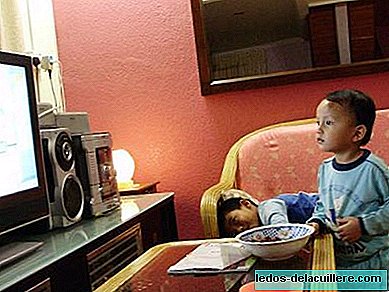
We have always been told, supported by common sense, that we should not have couple discussions in front of our children. Not only in regard to their education but to that part of our lives that does not yet have as our epicenter our children.
But to what extent is this good for our children? Does it really affect them negatively?
These questions and many more have been asked by a group of psychologists from the University of Notre Dame to conduct a study of about 500 children between the ages of 5 and 18 for 20 years. From the conclusions derived from the study it could be said that we must not always avoid arguing in front of our children, that if with many nuances.
The study
The study was conducted in "scenarios" recreated with actors that they had different types of discussions in front of the children, well and considering that there were 18-year-old people, I would say not so children. During the discussion behaviors were analyzed, and even saliva was analyzed to check the presence of cortisol, an indicator of the stress level.
The researchers realized that The experience was positive for the children when there was a solution to the discussion.
The discussions do not seem to affect children if they see that there is an effort to find a solution to the problem, he said. Mark E. Cummings, Professor of psychology at the University of Notre Dame and director of the study.
It was also found that those children who had witnessed an argument but had not witnessed how it was solved had higher cortisol levels than those who had seen it.
Children do what they see
Po Bronson, co-author of the book "NutureShock," states that he and his wife often argue in front of their children - an 8-year-old boy and a 5--year-old girl to teach them that although mom and dad argue, they also love each other and can come to an understanding.
Children imitate the behavior of adults and in this way we teach them that life is not pink, that there are discussions, but that this does not imply that we cannot reach any kind of agreement, nor that we have no affection for each other. We also imply that Dad and mom are not perfect, that they can make mistakes and that nothing happens for it.
In this way, they can get more prepared for real life. Being able to be successful in an argument.
Limitations to the study
In order for us to witness an argument that is useful to our children, it has to run in a calm way, without altering us in excess. Of course without insults or less price to one or the other. It must be an argument as if we had visitors at home. And above all we must try to find a solution, avoiding leaving the subject for another occasion.
Not everyone agrees
Not everyone agrees with this theory, and so the psychologist Ammanda Gummer agrees that if we keep our children away from the discussions we are not preparing them for real life, but you have to be a little sensible and realize that we don't always get a discussion in the right way and of course there are times when we will not reach a satisfactory solution for both parties. This, coupled with the fact that many times our children will not understand the nuances of an adult discussion, even when it occurs with the best of our intentions, which will cause them to not only learn nothing but feel disturbed and confused. .
It won't help them too much if they only see how we throw ourselves in the ground or Mom starts crying because Dad has made her feel bad, says Ammanda.
Too We are going to confuse you if in a moment we are calm and the next minute we start to scream. In that case it is best to leave the discussion and return to it later when we are calmer. Therefore, the doctor is not very much in favor of all discussions having to reach a solution at that time.
We know, by studies, that one year old babies are already quite sensitive to couple discussions Therefore it is not a subject to take lightly.
You have to be realistic and bear in mind that once a discussion starts we don't know where it will end, nor what the consequences will be. We do not know how the other person will react, no matter how much we know it, or if we will be able to maintain the forms at all times. Therefore, we must bear in mind that our children may witness situations that they will not understand or that may even frighten them. This is especially dangerous when we know that the arguments are going to have a strong emotional charge and can make the discussion rise quickly, "says Wendy Evans of Family Lives.
Evans is also not convinced that children do not know how to face real life if they do not see their parents argue because they already see enough discussions in online media and on television.
So it seems that the discussion is served, discuss in front of our children, yes or no?












